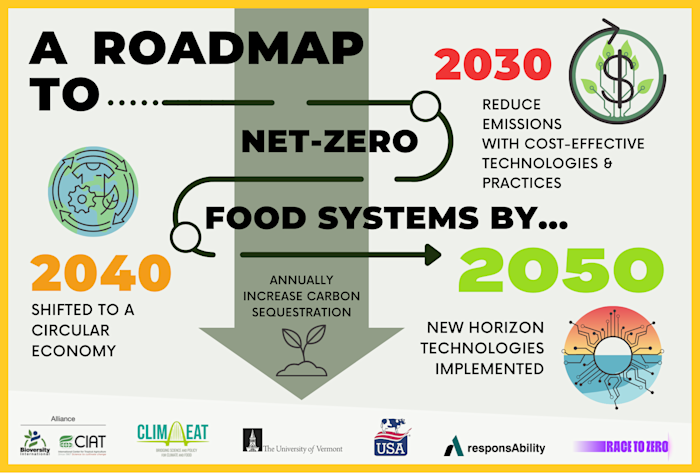A roadmap to achieving net-zero emissions
Envisioning net-zero food systems

Today, our food systems account for 35% of global greenhouse gas emissions and need a clear decarbonization plan if we are to reach the Paris agreement goal of limiting global warming to 1.5 degrees. Adding to the challenge comes a growing population, estimated to reach 9 billion by 2050, which will increase food demand and agriculture production.
It’s not just about producing enough food for a growing population; we also need to produce nutritious food and to ensure that we grow our food within planetary boundaries.
The need to start working collectively on food system transformation to reach net-zero has never been greater. This is why, in 2021 the world re-focused its attention on the pressing first task of bringing stakeholders together to build coalitions and connect agendas, resulting in ambitious government commitments at high-level UN summits and most of the largest food and beverage brands pledging to net-zero emissions by 2050. However, and despite the urgency of the task ahead, a clear strategy to prioritize interventions was lacking, with the private sector demanding something similar to what the UN’s International Energy Agency had successfully set for the global energy sector in its flagship roadmap report Net-Zero by 2050.
A group of scientists from CGIAR took the challenge and worked on a roadmap with clear action plans based on science-based targets and noted milestones for the journey. responsAbility was asked to collaborate in the report by identifying how private and public capital could be incentivized to finance such strategy. The final report is an outcome of a new assessment of over 60 scenarios based on current low-emission practices, which shows that realizing net-zero food systems will require widescale adoption of new technologies in the next two decades and changes in meat and dairy consumption. A more diverse set of practices and innovative research, including diet shifts and new-horizon technologies, will be needed for this transformation.
"Transforming food systems for net-zero is essential for the whole Paris Agreement equation to work and deliver on the need to limit the temperature increase to 1.5˚ C above pre-industrial levels by 2050, with important benefits for the resilience of millions of people around the world."
– Federico Bellone, Co-author, UN High Level Climate Champions & Race to Zero
However, there are no silver bullet solutions that work across local, regional and global scales. Local and regional food system intensification must identify locally relevant strategies to meet socio-economic and environmental targets.
"While net-zero food systems are achievable, bolder implementation of more efficient production practices is fundamental to meet both global food production and climate goals."
– Ciniro Costa Jr., Lead Author, Alliance of Bioversity International & International Tropical Research Center (CIAT)
The report builds on current promising green lending experiences in the energy sector and highlights the potential of traditional banks for scaling up validated cost-effective technologies and climate-smart agriculture; the role of blended-finance mechanisms to absorb some of the early risk and up-front cost associated with a shift away from linear business models and the development of new funding schemes required to sustain inflows of high-risk capital to incubate and accelerate new horizon technologies.
The report is the world’s first roadmap of how to transition to a net-zero food system by 2050 while promoting stable and affordable food production and healthier and nutritious diets.

The key milestones of the road map:
By 2030: Cost effective technologies and practices implemented
Reduce emissions from land-use change (e.g., deforestation and other land conversion) for food production.
Reduce emissions from nutrient management and water management in major grain systems (e.g., maize, wheat and rice).
Sequester CO2 by adopting agroforestry, applying biochar to soils and improving crop (e.g., tillage and cover crops) and pasture management (e.g., rotational grazing and fertilization) practices.
By 2040: Shifted to a circular economy. Country governance and technical assistance Improved
Scale up use of renewable energy (e.g., solar, wind).
Enhance fuel efficiency & expand fleet of electric transportation.
Improve fertilizer production.
Expand peri-urban agriculture.
Promote diet-shifts in high-and middle- income countries.
By 2050: New Horizon technologies implemented
Develop and produce affordable new-horizon technologies for negative emissions, with focus on livestock production systems.
Novel plants and perennials for carbon sequestration.
Enhanced energy efficiency for storing, processing, transporting, packaging and retailing.

Explore the full report on the Roadmap for achieving net-zero emissions in global food systems by 2050.
Authored by: Ciniro Costa, Eva Wollenberg, Mauricio Benitez, Richard Newman, Nick Gardner & Federico Bellone
In 2050, reductions will come mainly from technologies that are currently not present on farms. The timing of the report is fundamental, as governments and corporates need to maintain the commitments made to reprioritize spending on research and piloting to reduce emissions in value chains.
But most of the global reductions in food CO2 emissions needed between now and 2030 come from technologies and sustainable practices readily available today and it is the role of financial intermediaries to link them to the growing interest from investors in opportunities tapping the increasing demand for healthier, more equitable and more sustainable food.


Mauricio Benitez
Mauricio Benitez is responsAbility’s Food Systems Lead. He oversees the development and implementation of new investment solutions related to climate finance, sustainable food and natural capital and is currently working on a climate impact investment solution to help address key challenges of the global food system. He joined responsAbility in 2009, after 10 years working in Latin America and Eastern Europe, supporting small banks to improve credit risk management and strategy. Mauricio is a Swiss-Bolivian Economist and holds an MEcon degree from the University of the Western Cape and an MA in Development Management from the Ruhr Universität Bochum.